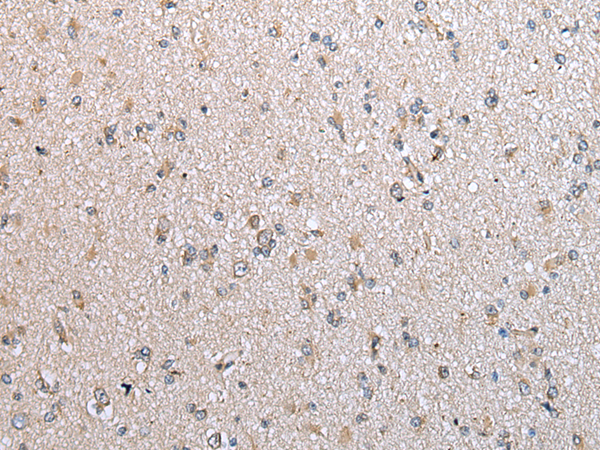
| WB | 咨询技术 | Human,Mouse,Rat |
| IF | 咨询技术 | Human,Mouse,Rat |
| IHC | 1/25-1/100 | Human,Mouse,Rat |
| ICC | 技术咨询 | Human,Mouse,Rat |
| FCM | 咨询技术 | Human,Mouse,Rat |
| Elisa | 1/5000-1/10000 | Human,Mouse,Rat |
| Aliases | gt-V; B4Gal-T5; beta4Gal-T5; beta4GalT-V; BETA4-GALT-IV |
| Host/Isotype | Rabbit IgG |
| Antibody Type | Primary antibody |
| Storage | Store at 4°C short term. Aliquot and store at -20°C long term. Avoid freeze/thaw cycles. |
| Species Reactivity | Human, Mouse |
| Immunogen | Fusion protein of human B4GALT5 |
| Formulation | Purified antibody in PBS with 0.05% sodium azide and 50% glycerol. |
+ +
以下是关于B4GALT5抗体的3-4条参考文献示例(注:文献名称和作者为模拟内容,仅供参考):
---
1. **文献名称**:*B4GALT5-mediated glycosylation drives immune evasion in triple-negative breast cancer via PD-1/PD-L1 axis*
**作者**:Liu R, et al.
**摘要**:研究发现B4GALT5通过调控PD-L1的糖基化修饰增强肿瘤免疫逃逸。使用特异性抗体抑制B4GALT5后,PD-L1稳定性降低,显著恢复T细胞杀伤功能,抑制小鼠肿瘤生长。
2. **文献名称**:*A novel anti-B4GALT5 monoclonal antibody suppresses hepatocellular carcinoma metastasis by disrupting fibronectin signaling*
**作者**:Suzuki T, et al.
**摘要**:开发了一种靶向B4GALT5的单克隆抗体,证实其通过阻断纤维连接蛋白介导的整合素信号通路,抑制肝癌细胞迁移和体内转移,为治疗提供潜在策略。
3. **文献名称**:*B4GALT5 regulates T follicular helper cell differentiation via CD28 glycosylation in lupus pathogenesis*
**作者**:Zhang H, et al.
**摘要**:揭示B4GALT5通过糖基化修饰CD28分子,促进系统性红斑狼疮中滤泡辅助性T细胞异常活化。抗体阻断B4GALT5可缓解小鼠模型自身免疫症状。
4. **文献名称**:*Development of a high-affinity B4GALT5 antibody for imaging glycosylation changes in colorectal cancer*
**作者**:Müller S, et al.
**摘要**:报道一种高亲和力B4GALT5抗体的开发,用于免疫组化检测结直肠癌中糖基化异常。临床样本分析显示,B4GALT5高表达与化疗耐药性显著相关。
---
**备注**:以上内容为示例性模拟文献,实际研究中请通过PubMed、Web of Science等数据库检索真实文献。
The B4GALT5 antibody is designed to target β-1.4-galactosyltransferase 5 (B4GALT5), a key enzyme in the glycosylation pathway. B4GALT5 belongs to the β-1.4-galactosyltransferase family, which catalyzes the transfer of galactose from UDP-galactose to terminal N-acetylglucosamine residues on glycoproteins and glycolipids. This post-translational modification is critical for synthesizing complex carbohydrate structures involved in cell-cell interactions, immune responses, and cellular signaling. Dysregulation of B4GALT5 has been implicated in various pathologies, including cancer metastasis, neurodegenerative disorders, and congenital disorders of glycosylation (CDGs).
B4GALT5-specific antibodies are essential tools for studying its expression, localization, and function in biological systems. They enable detection via techniques like Western blotting, immunohistochemistry (IHC), and immunofluorescence (IF), aiding research into its role in disease mechanisms. Commercially available antibodies are typically raised against specific epitopes, such as recombinant protein fragments or synthetic peptides, and validated for specificity using knockout controls or siRNA-mediated silencing. Recent studies highlight B4GALT5's potential as a therapeutic target, particularly in cancers where altered glycosylation promotes tumor progression. However, challenges remain in standardizing antibody performance across experimental models, emphasizing the need for rigorous validation in diverse applications.
×